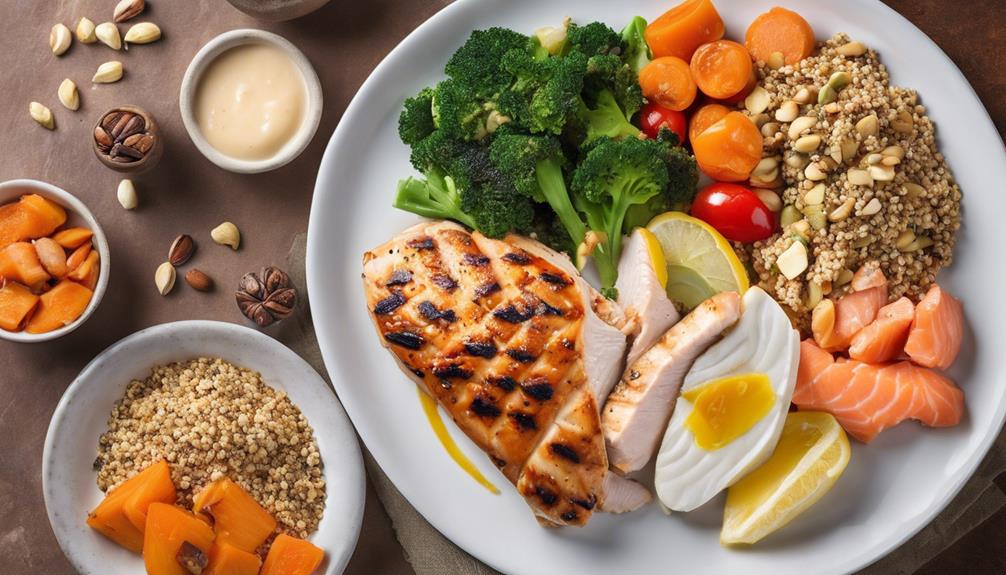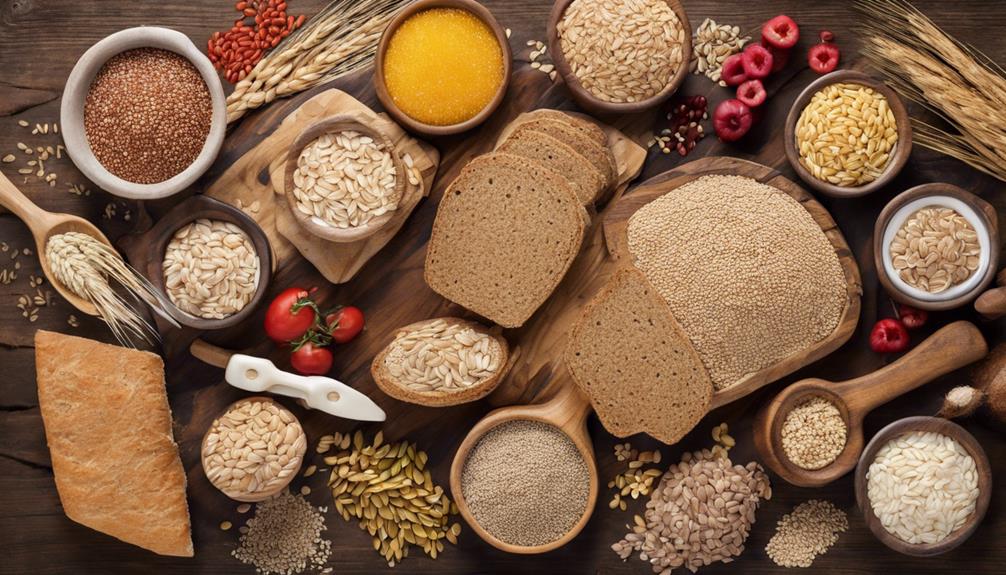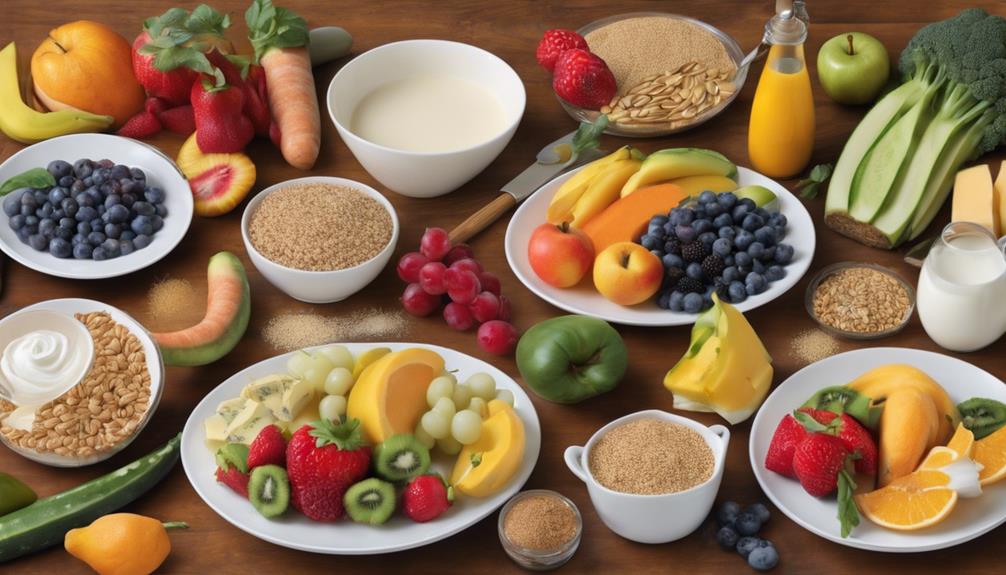As we navigate the world of nourishing foods for a breastfeeding mom's diet, it's fascinating how certain choices can truly impact both our well-being and that of our little ones.
From the power-packed nutrients in colorful fruits to the essential proteins aiding in milk production, each food group plays an important role.
But what about those lesser-known yet essential elements that could make a significant difference in our breastfeeding journey?
Stay tuned as we uncover some surprising additions for a well-rounded and nourishing diet that supports both mom and baby.
Key Takeaways
- Include nutrient-rich fruits like berries and mangoes for vitamins and hydration.
- Opt for lean protein sources such as chicken and tofu for tissue repair.
- Incorporate healthy fats from walnuts and avocados for brain development.
- Consume calcium-rich foods like dairy and leafy greens to maintain bone health.
Nutrient-Rich Fruits
When it comes to maintaining a nourishing diet while breastfeeding, incorporating a variety of nutrient-rich fruits is essential for meeting the nutritional needs of both the mother and the baby. Fruits such as berries, oranges, and mangoes are excellent choices as they provide essential vitamins, minerals, and antioxidants critical for breastfeeding moms. These fruits not only enhance the overall nutrient profile of breast milk but also support the mother's health during this demanding period.
Additionally, including apples in your diet can be beneficial due to their high fiber content, which aids in digestion, as well as their ability to keep you hydrated. Bananas are another great option as they're convenient, packed with potassium, vitamin C, and vitamin B6, which can help boost energy levels and support muscle function. Diversifying your fruit intake with options like kiwi, pineapple, and papaya ensures a broader spectrum of nutrients, promoting a healthy breastfeeding diet.
Watermelon and cantaloupe are also valuable choices for staying hydrated, increasing vitamin A intake, and aiding digestion, all important aspects of a breastfeeding mom's diet.
Lean Protein Sources

To support ideal tissue repair and development during breastfeeding, incorporating lean protein sources like chicken, turkey, lean beef, and fish into your diet is essential. These protein-rich foods play a critical role in postpartum recovery and aid in the repair and building of tissues, benefiting both you and your baby's growth and development. Opting for lean cuts of meat can help reduce saturated fat intake while still providing the necessary protein for your body's needs.
Additionally, plant-based protein sources such as beans, lentils, tofu, and quinoa offer excellent alternatives for vegetarians or vegans looking to maintain a balanced diet during this demanding period.
Ensuring an adequate intake of protein not only supports tissue repair but also helps in maintaining muscle mass, sustaining energy levels, and promoting overall health as you navigate the challenges of breastfeeding. By incorporating a variety of lean protein sources into your meals, you can provide your body with the essential nutrients it needs for the best postpartum recovery and well-being.
Healthy Fats
Incorporating a variety of healthy fats into your diet is essential for supporting brain development in breastfed infants and promoting overall health for both mother and baby. Omega-3 fatty acids, present in fish, chia seeds, and walnuts, play a critical role in nurturing your baby's cognitive growth.
Including avocado, rich in monounsaturated fats, not only aids in the absorption of important fat-soluble vitamins but also benefits the overall well-being of both you and your little one.
Coconut oil, known for its medium-chain triglycerides, can boost energy levels and assist in weight management during this demanding time. Olive oil, with its antioxidants and monounsaturated fats, offers heart-healthy advantages for breastfeeding moms.
Additionally, incorporating flaxseeds into your diet provides plant-based omega-3 fatty acids that contribute to reducing inflammation and enhancing your overall health. By including these sources of healthy fats in your meals, you're nurturing both your baby's development and your own well-being.
Whole Grains

Whole grains, such as brown rice, millet, and whole-wheat bread, are essential for providing fiber, B vitamins, and essential minerals needed for lactation. These grains offer sustained energy levels due to their complex carbohydrates, supporting moms through the demands of breastfeeding.
Additionally, whole grains play a vital role in maintaining digestive health, a common concern postpartum, by preventing constipation. Including whole grains in your diet can also help regulate blood sugar levels, preventing energy crashes and providing a more stable source of energy throughout the day.
Opting for whole grains over refined grains ensures a higher nutrient content, benefiting both you and your baby with essential vitamins and minerals necessary for overall health. Making whole grains a staple in your postpartum diet can contribute significantly to your well-being and lactation success.
Calcium-Rich Foods
Moving from the discussion on whole grains, we shift our focus to the importance of incorporating calcium-rich foods into a breastfeeding mother's diet for best bone health and nutrient support.
Calcium-rich foods such as dairy products, fortified plant-based milks, tofu, almonds, and leafy green vegetables play a critical role in maintaining bone density in breastfeeding moms. Adequate calcium intake isn't only essential for the mother's health but also guarantees that the baby receives essential nutrients through breast milk.
Including yogurt and cheese in the diet provides convenient sources of calcium for best bone health. It's recommended that breastfeeding women aim to meet the daily intake of 1,000 mg of calcium to support their own needs and those of their growing baby. By diversifying their calcium sources, breastfeeding moms can help prevent bone density loss and promote overall well-being during this important stage of life.
Frequently Asked Questions
What Are Important Foods for Breastfeeding Moms?
We prioritize protein-rich foods, vegetables, fruits, whole grains, and water for breastfeeding moms. These choices aid in tissue repair, milk production, overall health, sustained energy, and hydration. Our diet supports peak health for both mother and baby.
What Must a Breastfeeding Mother Eat?
When considering what must a breastfeeding mother eat, prioritizing nutrient-dense foods is key. Focusing on a variety of proteins, veggies, fruits, and whole grains, along with staying hydrated, supports milk production and overall health.
What Foods Boost Breast Milk Supply?
We can boost breast milk supply with foods like oats, fenugreek, brewer's yeast, mushrooms, and red/orange root veggies. These items are rich in nutrients that support milk production. Incorporating them into our diet may enhance lactation.
What Should I Eat to Lose Weight While Breastfeeding?
When breastfeeding and aiming to lose weight, we prioritize nutrient-dense foods like lean proteins, whole grains, fruits, veggies, and healthy fats. Regular exercise, like walking or yoga, supports weight loss. Consult a healthcare provider for personalized guidance.
Conclusion
To sum up, incorporating nutrient-rich fruits, lean proteins, healthy fats, whole grains, and calcium-rich foods into a breastfeeding mom's diet is essential for best health and milk production.
By prioritizing these food groups and staying hydrated, moms can support their own well-being and provide their baby with the necessary nutrients for growth and development.
Remember, a balanced diet is key to a successful breastfeeding journey.










